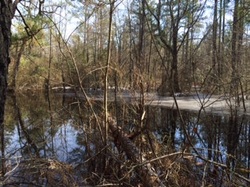|
You’ve been to various hiking or biking trailheads at the park. You’ve seen the notice about preventing Lyme disease. Well, folks, the weather notwithstanding, it’s spring and that means tick season. There are three ticks to watch for here: Blacklegged (a.k.a. Deer Tick), Lone Star and American Dog (a.k.a. Wood Tick). The Black-legged is the smallest and the one which transmits Lyme disease. The other two can also transmit diseases. On a warm day, these spider-relatives hang out on the tips of grasses and shrubs (in a position known as "questing") waiting to ambush unsuspecting passers-by. By all means, get out and enjoy the woods, but brush up on your tick-avoidance skills and do a careful tick check when you are back home. For more information visit ww.vdh.virginia.gov/TickBrochure.
--Ben
0 Comments
 That dark and obscure pool of water off in the woods that shows up during the winter, which we usually pass by with nary a thought, may be a forest biological hot spot. Vernal pools, as they are known, develop in depressions where water collects only during the wet weather of winter and spring. In these quiet, seasonal waters a variety of animal species find a hospitable habitat, primarily insects, crustaceans and amphibians. Water-dwelling insects as well as the smaller microbes pass through their brief life-cycles, providing food for the hatchlings of frogs, toads and salamanders who lay their eggs here. These larger predators are in turn part of the food web in the forest, so the vernal pools are an important component of forest ecology. Pools which do not serve as a breeding ground for frogs and salamanders are not included in the “vernal pool” category, although they may still benefit the forest ecosystem. The Pocahontas Master Naturalists are developing a monitoring program for vernal pools in the park. So far, 28 vernal pools have been identified. There are probably many more yet to be discovered. Spring is the critical time of year to view them because frog and salamander egg masses are easily identified now. --Ben |
The NaturalistThoughts on the park, its residents and how to preserve its natural beauty. Archives
September 2019
Categories
All
|

 RSS Feed
RSS Feed
